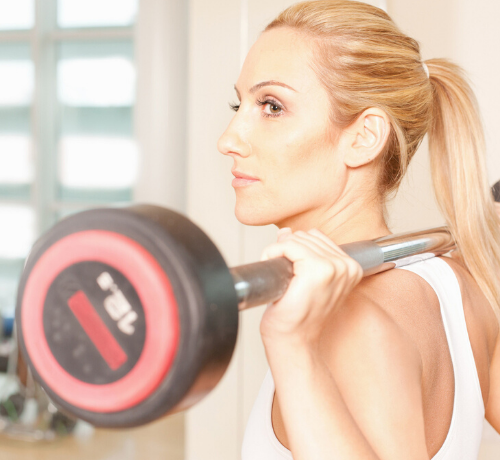1) You’re Getting Results!
If you’re exercising consistently, and not seeing any benefits, then your exercise regime most likely needs an overhaul.
But what if I am getting results?
Great question! First, go you! Secondly, the next question to ask yourself is, ‘are my results sustainable?’
The most important thing about fitness results is that we achieve them at a rate we can sustain.
There’s no point training 6 x week for a few months and then dropping down to training 1 x week and expecting to keep the same results. This strategy can upset the body and cause weight gain, potential injury, and can harm self-esteem if it’s done too many times.
If you’ve been doing the same exercises for a while and you’re starting to notice that you are no longer getting results, then they have probably plateaued. This means you it’s time to upgrade your exercise regime!
If you are working with an exercise professional, be sure to talk to them about your potential plateau. If they can’t help you overcome the problem, consider a new strategy.
2) Your Results Haven’t Plateaud
Your health and fitness is a constantly evolving thing, and our exercise regime should be able to adapt accordingly.
Our training should always provide us with ways to improve performance and results, without necessarily increasing the hours spent in the gym.
So, if your training has caused you to plateau, don’t be afraid to try something new. After all, you never know what you can achieve if you don’t give it a go!
General rule of thumb is this, if you’re not getting results, change your exercise regime. If you’re getting results that you can’t sustain for the next 5 years, change your exercise regime.
3) You are fully recovered within 1-2 days after a workout
It’s ok to be sore after exercise (although despite common opinion, it certainly isn’t a sign of a successful workout). However, the soreness should heal within 1 2 days. If you are not recovering in this time frame, consider lowering the intensity of your exercise program, or enhance your recovery regime.
Your results are restricted by your body’s ability to recover, repair and adapt after heavy exercise. If you are not recovering before your next workout, it means that your body hasn’t had a chance to adapt from the past workout.
Slow recovery = slow adaptation = slow results
4) You are fully recovered within 1-2 days after a workout
If you have a program that progressively gets harder, or more intense, or longer, or more demanding over the course of 3-6 weeks, then I trust you’re noticing the benefits! If you aren’t experiencing progress from your training every 3 to 6 weeks, then you might not be giving the body reason to adapt and improve.
We only get stronger, faster and fitter if the body is pushed to a new level. If we do the same workout everyday, there’s no reason for the body to adapt, because it can already handle the intensity of the workout. And our body’s wont waste energy building muscle if we don’t give it a reason to!
On the flip side, if we up the intensity of our workouts too quickly, our bodies are not able to recover and adapt at the speed that we are demanding of it. This is when injuries and compensational
movements start to impede our training.
If you’re not getting the results you want, try increasing one dimension on your workout at a time, for example, train longer,
train faster, train heavier, add an extra training session per week etc. But make sure you only adjust one thing at a time, otherwise you will overtrain, and your results will go backwards!
5) Overall you are feeling energised by your workouts – not exhausted by them
Exercise makes us tired. Sure. However, overall it should
improve our energy. It certainly shouldn’t exhaust us. If you are feeling exhausted by your training and it is impeding your ability to function in other areas of your life, it may mean that your body is not coping with the amount of stress you are putting it through (physical and mental).
If we are already in a stressful state or experiencing chronic stress, often long, endurance exercise or very high intensity exercise can increase the stress response in the body rather than help to lower it.
Make sure your exercise is contributing to your overall energy in a positive way, otherwise consider a new approach to better suit your lifestyle.
6) There is no acute pain during or after exercise
“No Pain, No Gain” I hear this a lot in the fitness industry. And to a certain extent, it makes sense. We do need to push our bodies to achieve adaptation and this can feel painful at times. But the ‘good’ pain is due to exertion and fatigue. It should be non-specific and should ease as soon as you stop exercising.
Acute, targeted or strong pain, on the other hand, should never be ‘pushed
through’. The body is designed to avoid pain and it will try to compensate it’s movement patterns in order to avoid pain as much as possible. So if we push through pain, or persist exercising through discomfort, we will create dysfunctional movement patterns and eventually do more damage.
Pain is a strong signal that something is wrong. Endeavor to resolve the problem, not push through it. Exercise should be strenuous, not painful.
7) You can feel the muscles that contribute most to the movement pattern you are doing
In the most effective training programs, every exercise is programmed for a purpose.
Different exercises work different muscles. We can only achieve overall fitness and good quality movement by training the entire body in balance.
To get the biggest bang for your buck, an exercise will be most effective when you know ‘what’ body parts you are training and ‘why’. With this awareness you can check in and ask yourself, ‘am I feeling this exercise in the right places?’
If the answer is no, you might be wasting your time or worse still, creating poor movement patterns by using the wrong muscles.
Building body awareness and doing exercises correctly is an important part of getting your best fitness results.
8) You are improving balance in your body
People LOOOVE to do things they’re good at! And it’s the same with exercise.
No one likes doing exercises that feel awkward, hard or weak. They want to do the exercises that makes them feel fit and powerful! The problem is, that if you do the same exercise every day, and avoid areas of weakness, eventually this will impede any further strength and fitness gains. The body will always be limited by the weakest link, and it can only compensate so much until it needs the weakest link to get stronger.
Work on your weakest link and I promise your results will improve!
9) You are respecting the fact that fitness is multi-faceted
How do you define fitness?Run fit? Strong? Flexible?Overall fitness allows us to truly use our bodies the way they were designed and to never feel restricted by them.
Here are a few things that should always form part of an overall fitness regime.
– Mobility, so the body can move through its full range of motion
– Functional movement patterns, so we move well and avoid injury
– Strength, so our body has a strong foundation to build off.
– Aerobic fitness, so you can improve endurance and recover faster.
– Co-ordination and balance, so you can keep doing awesome things that rely on body awareness and control (without the fear of injury)
Final Thoughts…
The right exercise for you is the one that works for your body and gets you results.
Too often, people choose exercise based on what they enjoy most, what is the easiest for them, what is the cheapest etc.This decision-making process has many flaws. Imagine if you lived your live based on this criteria and only did things that were fun, easy and free. You’d be the most irresponsible person in the world! And you certainly wouldn’t be getting any results in any area of life.
Taking responsibility for our own fitness involves making decisions based on the things that will get more results. Once you get results, then you earn the freedom to enjoy your body and do all the fun things that you now find easy!
Work is a great analogy. We work for money. Some people love their job, some people don’t. Regardless, we know that if we want the good lifestyle we need to do what needs to be done. The money we earn gives us the freedom to enjoy other areas of life.
Exercise is the same. Some people love it, some don’t. Regardless, you still need to do what needs to be done. If you choose your exercise based on the above 9 criteria, you will get far better results than the majority of the western world – that’s a fact!
If you’d like to learn how you can apply these 9 principles to your training, contact us today to arrange your free consult to discover your roadblocks and take your training to the next level!



